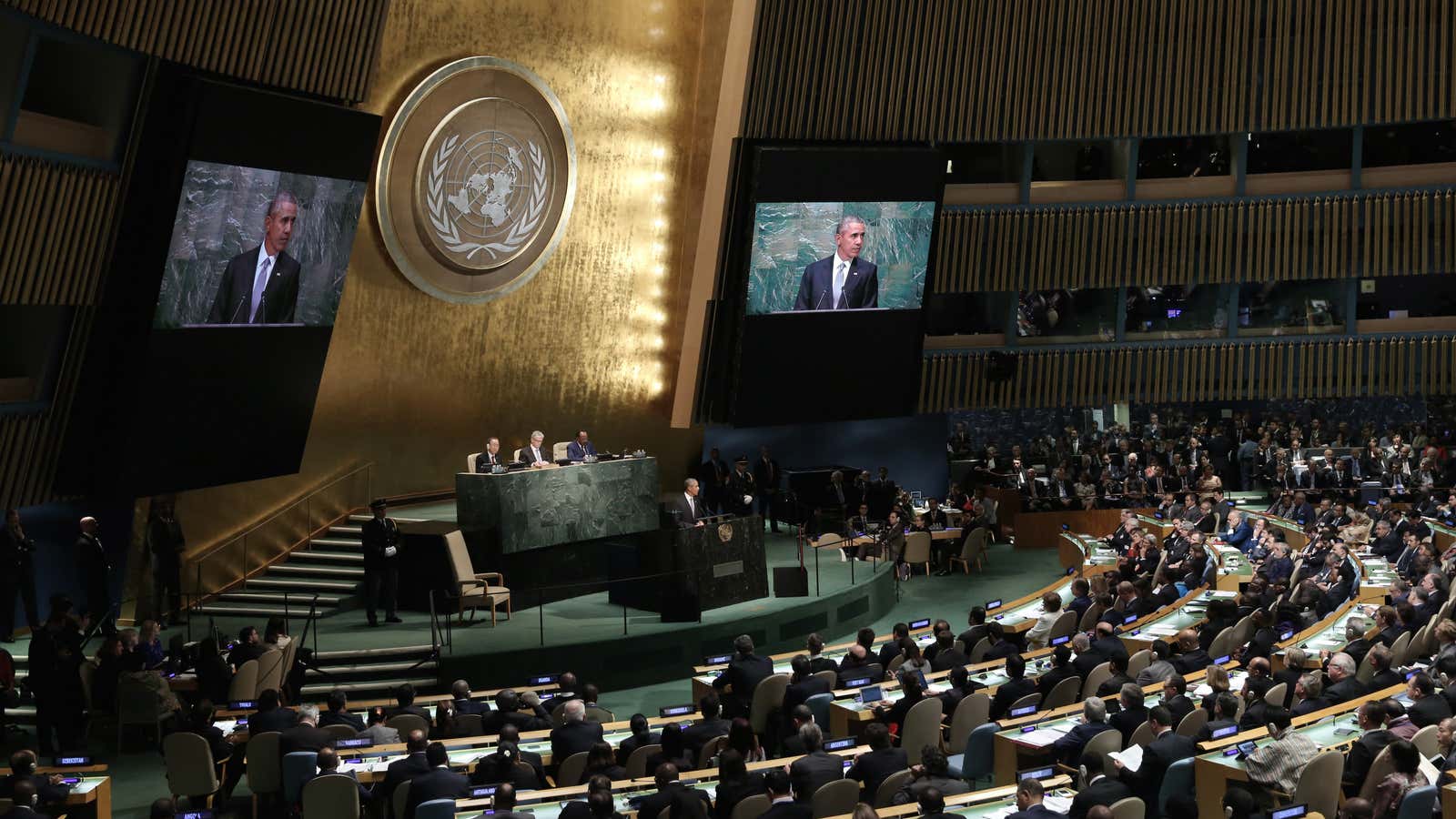Delegates, world leaders, and philanthropists from around the world flooded into New York City last week for the beginning of the 70th United Nations General Assembly (UNGA). But while the UNGA plans to discuss many important global issues over the next few weeks—notably the new goals regarding climate change and peacekeeping reforms—there is one glaring omission: Nowhere among the Assembly’s over 170 items is the Syrian or European refugee crisis specifically mentioned.
For a body committed by the preamble of its charter to eradicating war, strengthening human rights, advocating equality, and promoting “social progress and better standards of life in larger freedom,” this is significant. For critics of the UN, however, it is indicative of the organization’s ongoing inability to shift priorities in the wake of sudden-onset, large-scale crises.
This isn’t to say refugees won’t be mentioned at all as meetings progress. A spokesperson from the UN secretary general’s office told Quartz that Ban Ki-moon has called for the convening of a “High-Level Forum on Migration and Refugee Flows” on Wednesday, Sep. 30. The office could not elaborate any further as to the nature of the meeting, however.
The UN’s Sustainable Development Goals also mention this problem, referencing migrants repeatedly in various sections of their agenda. The Declaration for the 2030 Agenda for Sustainable Development, for example, mentions “the positive contribution of migrants for inclusive growth and sustainable development.” It notes that the UN “will cooperate internationally to ensure safe, orderly, and regular migration involving full respect for human rights and the humane treatment of migrants regardless of migration status, of refugees and of displaced persons.” Then there are the sustainable-development goals involving migrants. Goal 8, for example, encourages sustainable economic growth and works towards labor rights for all, including migrants. Similarly, Goal 10 seeks to “reduce inequality within and among countries.”
Still, the response seems incomplete. According to the World Bank, the current crisis in Syria alone has already cost countries in and around the Levant region (Turkey, Syria, Lebanon, Jordan, Iraq, and Egypt) close to $35 billion in economic output. Meanwhile, tens of millions of refugees await assistance. The world hasn’t witnessed a crisis this massive since the end of World War II.
It seems obvious that the UNGA represents an important and potentially unique opportunity for international collaboration on this issue, something president Obama noted in his speech to the GA on Monday. But speeches alone will not be enough to solve one of the greatest global refugee crises in recent history.
Maria Pia Belloni Mignatti, a member of the executive committee of the NGO Committee on Migration, told Quartz she believes that the UN has in part been stymied by the ongoing conflict in Syria, a contentious issue for the Obama administration. This “clearly indicates that international organizations have lost the ability to prevent or solve conflicts and to fight for the protection of human rights,” she said.
State sovereignty belies this inability. Supranational institutions can encourage solidarity among member states, as the European Union did in a recent decision to distribute migrants. But ultimately, it is up to individual states to implement their own policies and follow those the EU adopts.
Speaking with Quartz, University of Southern California law professor Niels Frenzen gave the Dublin Regulation as an example. The Dublin Regulation is a European Union law that identifies which member state has responsibility for a refugee’s asylum claim. For instance, if a Syrian refugee enters the Schengen Zone (a group of European countries that allow free movement across their borders) in Greece, then migrates to France, he or she can be deported back to Greece under the Dublin Regulation.
But even here, compliance is recommended, but not mandatory. Germany has opted out of the regulation for example, even as it closes its borders.
Recently, the UN has faced criticism for its “numbing bureaucracy” and resistance to reforms. Member states are part of the problem. Russia, the United States, China, France, and the United Kingdom have veto power, and often block motions supported by rivals, further stagnating the process.
The UN must readjust its approach to remain an effective force in international affairs—the lives and livelihoods of millions of people depend on it. In its current state, the lumbering organization simply cannot respond quickly enough to the world’s most important problems.
“This is a different kind of migration,” said Mignatti. “It’s the first time in history that this migration is so strong, so global. We have to find new tools.”




